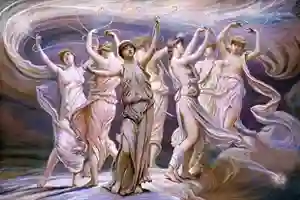Folklore and Mythology: From ancient civilizations to modern societies, folklore and mythology have played a […]
![]()

Mythology: Understanding Ancient Beliefs and Legends
Mythology is the study of traditional stories and beliefs that explain the origins of the world, human nature, and supernatural beings. These stories are often passed down through generations and are an important part of human culture and history. Mythology helps us understand ancient beliefs and legends that have influenced our modern-day culture and beliefs.
Mythology in Ancient Times
Mythology played a significant role in ancient societies, providing explanations for natural phenomena, human behavior, and the existence of gods and goddesses. Many ancient cultures, such as the Greeks, Romans, Egyptians, and Norse, developed complex mythologies that shaped their beliefs, values, and rituals.
In Greek mythology, for example, the gods and goddesses represented different aspects of human nature, such as love, war, wisdom, and beauty. The myths were used to explain the origins of the world and the actions of the gods, as well as to provide moral lessons and inspire art and literature.
Similarly, in Norse mythology, the gods and goddesses were associated with natural phenomena, such as thunder, lightning, and the seasons. The myths also depicted the struggles and triumphs of the human race, as well as the afterlife and the end of the world.
Mythology in Modern Times
Although many ancient myths have been lost or forgotten, their influence can still be seen in modern-day culture. Myths have inspired literature, art, music, and film, and continue to shape our beliefs and values.
For example, the myth of the hero’s journey, popularized by Joseph Campbell, has become a common theme in literature and film. The hero’s journey involves a protagonist who goes on a quest, faces challenges, and ultimately achieves a transformative experience. This myth has been used to inspire countless stories and characters, from Harry Potter to Luke Skywalker.
Similarly, the mythology of ancient gods and goddesses has influenced our modern-day understanding of morality, beauty, and human nature. Many words and phrases in modern English are derived from Greek and Roman mythology, such as “Achilles’ heel” and “Herculean task.”
Conclusion
Mythology is a rich and fascinating field of study that helps us understand ancient beliefs and legends. By exploring the myths of different cultures, we can gain insights into human nature, the origins of the world, and the role of gods and goddesses in our lives. Furthermore, mythology continues to influence modern-day culture, inspiring stories, characters, and values that shape our beliefs and understanding of the world.
Folklore and Mythology: From ancient civilizations to modern societies, folklore and mythology have played a […]
![]()
Iskcon Temple Mayapur: The International Society for Krishna Consciousness temple in Mayapur, West Bengal, India, […]
![]()
![]()
![]()
![]()
![]()
![]()
![]()
![]()
![]()
![]()
![]()
Significance of Buddha purnima: Buddha Purnima, also known as Vesak or Buddha Jayanti, is one […]
![]()
![]()
![]()
![]()
![]()
![]()
![]()
![]()
![]()
![]()
![]()
Significance of good Friday: Good Friday is a significant Christian holiday that is observed annually […]
![]()
![]()
![]()
![]()
![]()
![]()
![]()
![]()
![]()
![]()
![]()
Bible: The Bible is arguably the most influential book in history. It has shaped the […]
![]()
![]()
![]()
![]()
![]()
![]()
![]()
![]()
![]()
![]()
![]()
Quran: The Quran is the holy book of Islam, containing the teachings and guidance of […]
![]()
![]()
![]()
![]()
![]()
![]()
![]()
![]()
![]()
![]()
![]()
Eid: One of the most significant celebrations in the Islamic calendar. It marks the end […]
![]()
![]()
![]()
![]()
![]()
![]()
![]()
![]()
![]()
![]()
![]()
Introduction: Goddess Durga is one of the most prominent and revered figures in Hindu mythology. […]
![]()
![]()
![]()
![]()
![]()
![]()
![]()
![]()
![]()
![]()
![]()
Valmiki’s Curse: The Mythology of a Vengeful Sage In Hindu mythology, Valmiki is known as […]
![]()
![]()
![]()
![]()
![]()
![]()
![]()
![]()
![]()
![]()
![]()
Shesha Naga: A Mythological Serpent In Hindu mythology, Shesha Naga, also known as Ananta Shesha […]
![]()
![]()
![]()
![]()
![]()
![]()
![]()
![]()
![]()
![]()
![]()